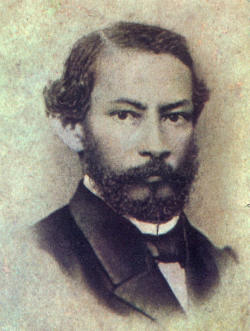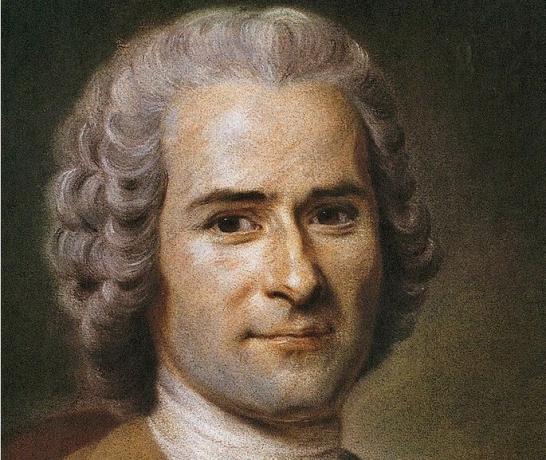Gonçalves Dias was one of the greatest poets of the first romantic generation in Brazil. He was patron of Chair 15 at the Brazilian Academy of Letters (ABL).
Remembered as an Indianist poet, he wrote on themes related to the figure of the Indian. In addition to being a poet, he was a journalist, lawyer and ethnologist.
Biography

Antônio Gonçalves Dias was born on August 10, 1823 in the city of Caxias, Maranhão.
He entered the University of Coimbra in 1840, graduating in Law. In 1845, he returned to Brazil and published the work "First Tales". He is appointed Professor of Latin and Brazilian History at Colégio Pedro II, in Rio de Janeiro.
There, at the time the capital of Brazil, he worked as a journalist and literary critic in newspapers: Jornal do Commercio, Official Gazette, Correio da Tarde and Sentinela da Monarquia.
He was also one of the founders of the Magazine Guanabara, an important vehicle for the dissemination of romantic ideals. In 1851 he published the book "last corners".
At that time he meets Ana Amélia, but being mestizo, her family did not allow the marriage. Thus, he marries Olímpia da Costa, with whom he was not happy.
In 1854 he left for Europe and met his Ana Amélia, who was already married. From this encounter, the poem “ Once again-bye-bye!”.
In 1864, after a period in Europe for health treatment, he returned to his homeland, still debilitated.
On November 3, 1864, the ship he was on sinks. The poet died near the city of Guimarães, Maranhão, at 41 years of age.
Main Works and Features
Indian works
O Indianism marked the first phase of romanticism in Brazil. With this, several writers focused on the figure of the idealized Indian.
In addition to these themes, the works of that first moment also had a very nationalist and patriotic character. For this reason, this phase was known as the binomial "Indianism-nationalism".
From the Indianist work of Gonçalves Dias, the following stand out:
- Tamoio song
- I-Juca-Pirama
- green leaf bed
- Corner of Piaga
Lyrical-loving works
In this phase, Gonçalves Dias exalted love, sadness, longing and melancholy. Of his poetic work, the following deserve mention:
- if you die of love
- Once again-bye-bye!
- Your eyes
- exile song
- Friar Antao's Sextiles
the main books from Gonçalves Dias are:
- first corners
- second corners
- last corners
- corners
Also read about the Indianist Novel.
Song of Exile
Without a doubt, the Song of Exile is one of the writer's most emblematic poems. Published in 1857, in this poem Gonçalves Dias expressed the loneliness and longing he felt for his homeland when he was in Portugal.
My land has palm trees,
Where the Sabiá sings;
The birds, which chirp here,
It doesn't chirp like there.
Our sky has more stars,
Our floodplains have more flowers,
Our forests have more life,
Our loves more life.
In brooding, alone, at night,
More pleasure I find there;
My land has palm trees,
Where the Sabiá sings.
My land has primes,
Such as I do not find here;
In brooding — alone, at night —
More pleasure I find there;
My land has palm trees,
Where the Sabiá sings.
Don't let God let me die,
Without my going back there;
Without enjoying the primes
That I don't find around here;
Without even seeing the palm trees,
Where the Sabiá sings.
poems
Check below also some excerpts from the best poems by Gonçalves Dias:
Tamoio song
Do not cry, my son;
don't cry, that life
It's a close fight:
To live is to fight.
life is combat,
Let the weak slaughter,
May the strong, the brave
It can only exalt.
One day we live!
the man who is strong
Don't fear death;
He is only afraid of running away;
in the bow that tenses
There's a certain prey,
Whether tapuia,
Condor or tapir.
I-Juca-Pirama
my death song,
Warriors, I heard:
I'm a child of the jungles,
In the jungles I grew up;
warriors coming down
From the Tupi tribe.
From the mighty tribe,
who is now wandering
Due to fickle fate,
Warriors, I was born:
I'm brave, I'm strong,
I am a child of the North;
my death song,
Warriors, I heard.
Corner of Piaga
O Warriors of the holy Taba,
O Warriors of the Tupi Tribe,
Gods speak in the corners of Piaga,
O Warriors, my songs have heard.
Tonight — it was the moon already dead —
Anhangá prevented me from dreaming;
Here in the horrible cave, which I inhabit,
A hoarse voice started calling me.
I open my eyes, restless, fearful,
Manitots! what wonders I saw!
Burn the smokey resin stick,
It wasn't me, it wasn't me, who lit it!
A ghost bursts at my feet,
A ghost of immense extension;
Smooth skull rests beside me,
Ugly snake curls up on the ground.
Once again - goodbye
Finally see you! — finally I can,
Bent at your feet, tell you,
That I never stopped wanting you,
Regret how much I suffered.
I felt very sorry! Raw cravings,
From your eyes away,
they had me down
Not to remember you!
From one world to another impelled,
I shed my regrets
On the deaf wings of the winds,
From the sea on the crested neck!
Bucket, lucky trick
In a strange land, among people,
What evils do you not feel,
He doesn't even feel sorry for the unfortunate one!
if you die of love
If you die of love! — No, you don't die,
When is fascination that surprises us
A noisy soiree between celebrations;
When lights, heat, orchestra and flowers
Sighs of pleasure streak in our soul,
How embellished and relaxed in such an environment
In what he hears, and in what he sees, pleasure achieves!
(...)
This one, who survives his own ruin,
By living from the heart, — gratefully
Illusions, when in solitary bed,
Among the shadows of the night, in long insomnia,
Daydreaming, looking forward to future adventures,
Show yourself and play with the desired image;
This one, who does not succumb to such pain,
Envy whoever finds them in the grave
From your ills, the desired term!
Read more about the romantic movement in Brazil:
- Romanticism in Brazil
- Romanticism: Characteristics and Historical Context
- Romantic Generations in Brazil
- The Language of Romanticism
- Brazilian Romantic Poetry
- First Generation Romantic



